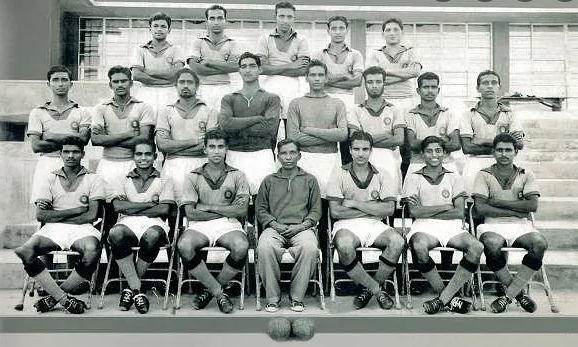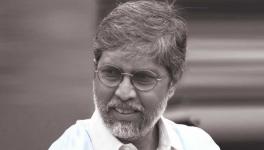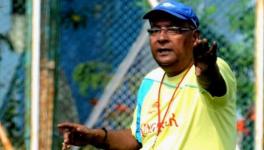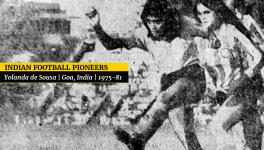Tokyo Olympics’ Harsh Reality Check for Indian Football

The immediate casualty of legendary coach Syed Abdul Rahim’s (centre, bottom row) death was India’s Olympic campaign. The Asian champions failed to qualify for the Tokyo Games in 1964. For the first time since Independence no Indian football team could travel to the Olympics. What was seen as an exception in 1964, soon became the norm.
June 11, 1963 was a sad day for Indian football. On this day in Hyderabad, the legendary coach Syed Abdul Rahim passed away. Only nine months ago in September 1962, he spearheaded India’s historic triumph at the Jakarta Asian Games. His untimely death at the age of 53 was a body blow that Indian football could hardly recover from.
The immediate casualty was India’s Olympic football dream. The Asian champions failed to qualify for the Tokyo Games in 1964 – for the first time since Independence no Indian football team could travel to the Olympics. What was seen as an exception in 1964, soon became the norm. Never ever after this India could come anywhere near attaining an Olympic berth in football.
Sukumar Samajpati was one of the key players of the squad that got knocked out by Iran in the final qualification battle for Tokyo 1964. Having retired as a top executive of a nationalized bank, Samajpati, now pushing 80, leads a contented life in Kolkata. But he still has one regret in life. Not being able to qualify for the Olympics, Samajpati feels, is the biggest failure of his career.
Click | For Coverage of the Tokyo Olympics From Newsclick Sports
“There were three reasons why we messed it up,” says the star right winger of his time, who later excelled as a classical singer. “One, the absence of Rahim Sahib on the technical bench was a huge disadvantage. Secondly, Rahim’s replacement, Harry Wright, was a disaster. And finally, I must confess, Iran were a formidable side. Though in the second leg at Kolkata, our performance was shamefully poor.”
Samajpati is not far from the truth about the outing in Kolkata. Given India’s form those days at the continental level, their showing against Iran came as a shock. In 1962, India won the Asian Games gold. On June 2, 1964, the Chuni Goswami led side came up with yet another creditable performance by finishing runners-up in Asian Cup in Tel Aviv behind Israel. The morale of the team was high when they left Tel Aviv for Tehran to play the first leg of the qualifier against Iran on June 7.
It was a sheer disaster though. India played aimless football to lose 0-3. Things were no better when Iran travelled to Kolkata to play at the newly-constructed Rabindra Sarobar Stadium. Chuni Goswami gave India an early lead but Iran struck thrice thereafter to leave the hosts shattered. The aggregate of 6-1 was like a tennis score.
Also Read | Pandemic or Not, Lockdown of Women’s Football in India Continues
The Indian football fraternity was truly shocked. None expected the Asian champions to get humiliated so badly. The start, after all, wasn’t poor. India began the qualifiers with a bang. A 5-3 away victory over Ceylon (now Sri Lanka) was capped with a 7-0 triumph at home in Bangalore. India’s next opponents were Lebanon, who withdrew from the competition. Hence India were pitted against Iran for a spot in Tokyo.
No doubt, India badly missed Rahim. The new coach Harry Wright was a former club level goalkeeper in Britain who landed a coach’s job at the National Institute of Sports (NIS) in Patiala. He had a coaching license, which Rahim didn’t have. The education ministry in Delhi felt Rahim should do a course under Wright. When Rahim refused, the ministry suggested he at least should attend Wright’s theory classes.
Everyone in Indian football thought the offer was an insult to Rahim, who by then had two Asian Games gold medals under his belt. The Hyderabad-based coach had already coached India in three consecutive Olympics – India finished fourth under him in Melbourne 1956. To force him to undergo a crash course wasn’t a wise idea.
Rahim himself solved the problem – he passed away in June 1963 leaving behind a huge number of the country’s top class footballers, who used to treat him like a demigod. With the Tokyo Olympics approaching, the post of chief coach fell vacant. The politics began at the right earnest in the corridors of All India Football Federation (AIFF).
GM Pentiah of Andhra Pradesh was made the coach for the Olympic qualifiers against Ceylon. Why he did not last thereafter despite two smooth wins, remains a mystery. There was some pressure from the ministry, perhaps. Wright stepped in and India courted disaster.
Also Read | Indian Hockey Gold at Tokyo Olympics: A Reality Then, a Dream Now
Wright had little control over the team and he played into the hands of star footballers, alleged a member of the team once, who did not wish to be named. There was lack of discipline, which became a huge issue after India landed in Tehran for the crucial match against Iran.
“Wright could hardly communicate with his players. He rarely held theory classes and that too on the morning of the match. After being coached by Rahim for so many years, we were very much frustrated by the way Wright handled the team,” said Samajpati.
I Arumainayagam, who was also a member of the team, once told this correspondent that he felt Wright had lost it long before. “In Tehran, the match was played on an uneven surface. Wright had forced the team to train there the day before the match for three hours under extreme humid conditions. We were left with little energy when the actual match was played the next day,” he recalled.
But then, it would be unfair to blame Wright alone for the non-qualification. To put it straight, the great team that Rahim fastidiously raised from 1956 onwards, was slowly disintegrating for natural reasons. A bunch of exceptionally talented players were then approaching the end of their brilliant careers.
What made Rahim’s India a crack side in the continent was the presence of three forwards – PK Banerjee, Tulsidas Balaram and Chuni Goswami. The trio would go down in history as the country’s most dazzling strikers.
When the qualification time for 1964 Tokyo approached, two of these three players were missing. Balaram’s career suffered a setback – he had to quit football permanently on medical advice. His lungs could be damaged forever if he continued playing, advised the doctors. PK Banerjee suffered a fracture, which kept him out of both the Asian Cup in Tel Aviv and the Olympic qualifiers.
Also Read | Stats the Way Forward, Feel Indian Football Bosses; National Coach Igor Stimac Gets Extension
Chuni continued to lead the side, but he too had an injury. In the away match against Ceylon, he was hit on the face and had to be carried away. He returned to the field after a few minutes and stayed till the end, but had to undergo a jaw surgery thereafter. He wasn’t at the top of his fitness when the Iran matches approached.
Nothing clicked for India in 1964. The guiding force behind the team suddenly passed away, the best strikers were missing. Few talented youngsters like Syed Nayeemuddin and Inder Singh had arrived at the scene by then, but they were too raw to make a mark at the international level.
Chuni, in all probability, realized things were no more the same; he had been left alone. After losing to Iran in the Olympic qualifiers in June 1964, India participated in Merdeka in August-September the same year. The five-day preparatory camp was held in Bombay (now Mumbai). A Day before leaving for Kuala Lumpur, on August 20, Chuni informed a stunned local media that this would be his last international tournament for the national team.
No amount of persuasion could change his mind. India finished runners-up in Merdeka. Chuni Goswami called it a day at the age of 26. He did play domestic football for a couple of more years before hanging his boots.
Overall, the non-qualification for Tokyo ’64 was a sad moment for Indian football – it was the beginning of a downfall that could never be properly arrested since then.
Things have changed now, so has the qualification process. Olympic football has been converted into an under-23 tournament mainly, the qualifications in Asia have been clubbed into the AFC under-23 meet. For Tokyo 2021, India stood nowhere as they stumbled at the first hurdle against hosts Uzbekistan and Tajikistan in the preliminary group league matches.
The 1964 Olympics exit made the Indian fans express genuine shock. The elimination from the 2021 Olympics hardly made news. A true advertisement for the cash-rich developmental platforms of Indian football.
Get the latest reports & analysis with people's perspective on Protests, movements & deep analytical videos, discussions of the current affairs in your Telegram app. Subscribe to NewsClick's Telegram channel & get Real-Time updates on stories, as they get published on our website.
























